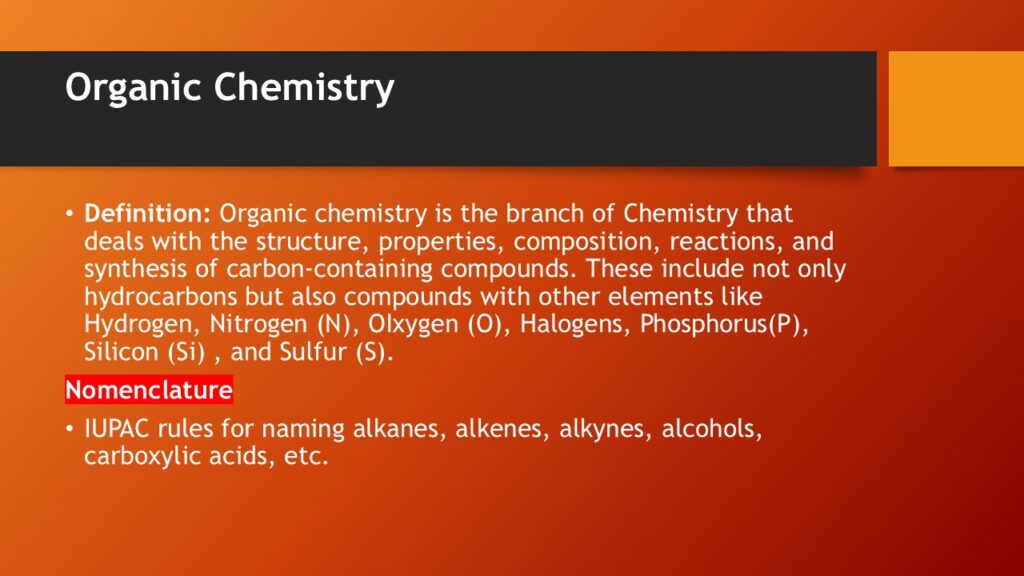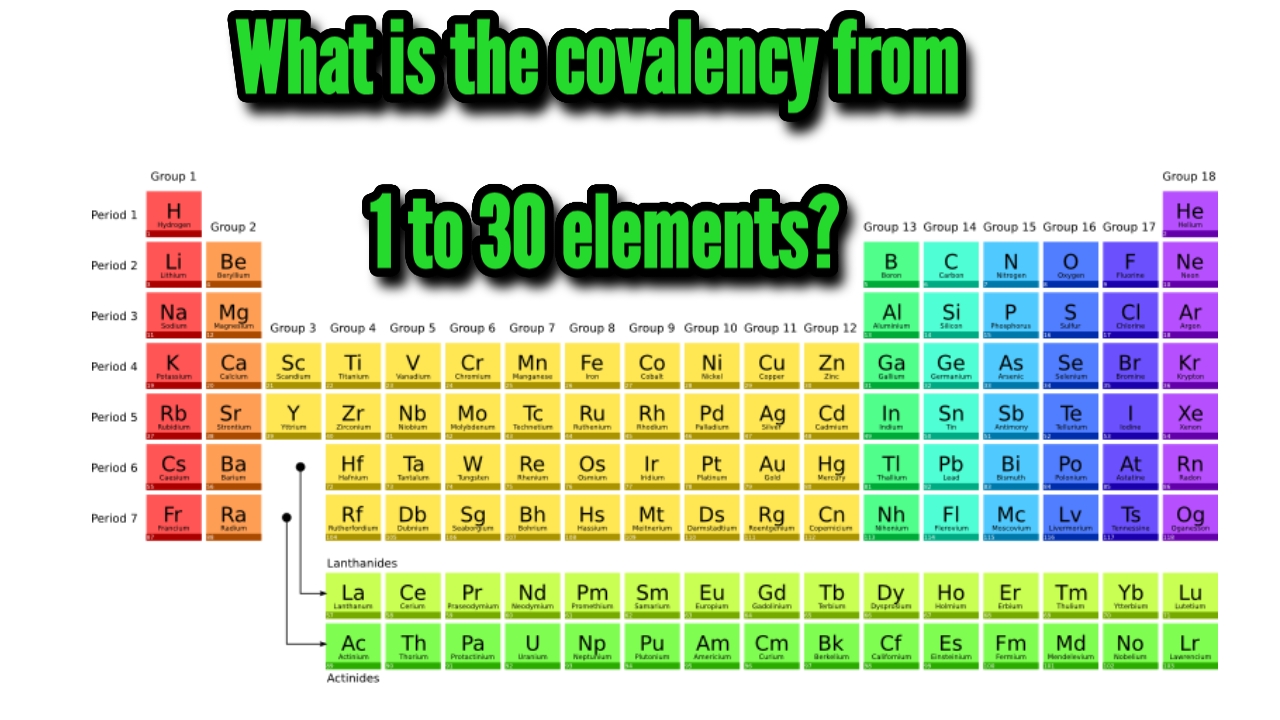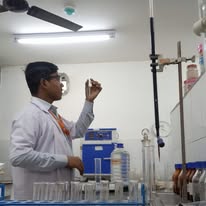What is Chemistry Definition, Main Branches of Chemistry, Importance of Chemistry in Our World
What is Chemistry Definition, Main Branches of Chemistry, Importance of Chemistry in Our World
Definition of Chemistry
Chemistry is the scientific study of matter, its properties, composition, structure, the changes it undergoes during chemical reactions, and the energy changes that accompany these processes.
Chemistry bridges other natural sciences like physics, geology, and biology, earning its nickname as “the central science.”
Main Branches of Chemistry
1. Organic Chemistry
Definition: Organic chemistry is the branch of Chemistry that deals with the structure, properties, composition, reactions, and synthesis of carbon-containing compounds. These include not only hydrocarbons but also compounds with other elements like Hydrogen, Nitrogen (N), OIxygen (O), Halogens, Phosphorus(P), Silicon (Si) , and Sulfur (S).
The study of carbon-containing compounds and their reactions, typically involving hydrocarbons and their derivatives.
Nomenclature
- IUPAC rules for naming alkanes, alkenes, alkynes, alcohols, carboxylic acids, etc.

Focus areas: Structure, properties, composition, reactions, and preparation of carbon-based compounds (including those with C-H bonds).
Examples: Petroleum products, Pharmaceuticals, Plastics, DNA(Deoxyribonucleic Acid) .
2. Inorganic Chemistry
Definition: Inorganic Chemistry is the branch of chemistry that studies the structure, properties, reactions, and uses of inorganic compounds—that is, compounds not based primarily on carbon-hydrogen (C-H) bonds.
The study of inorganic compounds, which typically lack carbon-hydrogen bonds.
What It Includes:
Inorganic chemistry covers a wide variety of substances
Elements (like oxygen, iron, sodium), Salts (like NaCl, KNO₃), Oxides (like CO₂, SO₂),Acids and bases (like HCl, NaOH),Metals and alloys,Coordination compounds (like [Fe(CN)₆]³⁻), Minerals and ores
3. Physical Chemistry
Definition: Physical Chemistry is the branch of chemistry that explains how and why chemical reactions happen using the principles of physics and mathematics.
It focuses on the energy, speed, and structure of chemical systems — studying atoms, molecules, and reactions at a fundamental level.
The study of the fundamental physical principles that govern chemical systems and processes.
Focus areas: Thermodynamics, quantum chemistry, chemical kinetics, spectroscopy.
Examples: Reaction rates, energy transfer in reactions, molecular structures.
4. Analytical Chemistry
Definition: The study of the composition and structure of matter through identification, quantification, and separation techniques.
Focus areas: Qualitative and quantitative analysis, instrumentation, method development.
Examples: Drug testing, environmental monitoring, quality control.
5. Biochemistry
Definition: The study of chemical processes within and relating to living organisms.
Focus areas: Structure and function of biomolecules, metabolic pathways, molecular genetics.
Examples: Enzymes, proteins, DNA, cellular respiration.
6. Theoretical Chemistry
Definition: The application of mathematics and physics to explain or predict chemical phenomena.
Focus areas: Computational chemistry, quantum chemistry, molecular modeling.
Examples: Predicting molecular properties, reaction mechanisms.
7. Nuclear Chemistry
Definition: The study of radioactive substances and nuclear processes.
Focus areas: Radioactive decay, nuclear reactions, radioactive tracers.
Examples: Nuclear power, radiopharmaceuticals, carbon dating.
- All About Vitamins Functions, Sources, Deficiencies And Sample Questions
- How to Determine Normality of Sodium Thiosulfate
- Preparation of 4% Neutral Boric Acid Solution
- Preparation and Titration of 0.2N HCl
- Full Hand Writing Copy Note Of Tin (Sn) with PDF
8. Environmental Chemistry
Definition: The study of chemical phenomena in the environment.
Focus areas: Pollution, chemical processes in air/water/soil, green chemistry.
Examples: Ozone depletion, acid rain, waste treatment.
9. Industrial Chemistry
Definition: Industrial Chemistry is the branch of chemistry that deals with the commercial production of chemicals and chemical products using large-scale industrial processes. It bridges pure chemistry and chemical engineering to create materials used in everyday life — from plastics and fertilizers to pharmaceuticals and fuels.
The application of chemical processes to industrial production.
Focus areas: Chemical manufacturing, process optimization, scale-up.
Examples: Fertilizer production, polymer manufacturing.
10. Medicinal Chemistry
Definition: The design and development of pharmaceutical drugs.
Focus areas: Drug discovery, drug design, structure-activity relationships.
Examples: Antibiotics, antivirals, chemotherapy agents.
Interdisciplinary Fields
- Materials Chemistry: Development of new materials with specific properties
- Astrochemistry: Study of chemical composition in space
- Electrochemistry: Study of chemical reactions involving electricity
- Polymer Chemistry: Study of macromolecules and polymers
- Supramolecular Chemistry: Study of non-covalent interactions between molecules
The Vital Importance of Chemistry in Our World
Foundation of Modern Life
Chemistry is the backbone of virtually every aspect of modern existence. From the air we breathe to the food we eat, chemical processes are constantly at work. The development of new materials, medicines, and technologies all rely on chemical principles.
Medical Advancements
The pharmaceutical industry depends entirely on chemistry to develop life-saving drugs and treatments. Chemistry enables:
- Discovery of new antibiotics to fight resistant bacteria
- Development of vaccines (like those for COVID-19)
- Cancer treatments through chemotherapy drugs
- Medical imaging technologies (MRI contrast agents)
Environmental Protection
Chemistry provides solutions to environmental challenges:
- Water purification systems for clean drinking water
- Air pollution control technologies
- Development of biodegradable materials
- Renewable energy technologies (solar cells, batteries)
“Green chemistry is not just about reducing waste; it’s about rethinking chemical processes to work with nature rather than against it.”
Food Production and Agriculture
Food Production and Agriculture in chemistry refers to the application of chemical principles and substances to grow, protect, and preserve food. It includes the use of fertilizers, pesticides, preservatives, and biotechnology to increase crop yield, fight pests, and enhance food quality.
Chemistry revolutionizes how we grow and preserve food:
- Fertilizers that increase crop yields (Haber-Bosch process)
- Pesticides that protect crops (used responsibly)
- Food preservation techniques that reduce waste
- Nutritional analysis for healthier diets
Technology and Innovation
In chemistry, technology is the use of chemical knowledge to design tools, materials, or methods.
Innovation is creating new or improved technologies, often by applying discoveries in chemical research.
Every technological advancement depends on materials developed through chemistry:
- Semiconductors for computers and smartphones
- Lightweight alloys for aerospace applications
- LCD screens and OLED displays
- Advanced battery technologies
- Development of clean energy sources:
- Hydrogen fuel cells
- Solar cells (photovoltaics)
- Rechargeable lithium-ion batteries
- Advanced filtration systems using activated carbon, reverse osmosis, and nanomaterials
- Innovations in food preservation, flavors, and smart packaging that detect spoilage
Energy Solutions
Chemistry is crucial in addressing global energy needs:
- Fossil fuel refinement and processing
- Development of alternative energy sources
- Energy storage systems (lithium-ion batteries)
- Hydrogen fuel cell technology
Everyday Products
Countless daily-use items result from chemical innovation:
- Personal care products (soaps, shampoos, cosmetics)
- Cleaning agents and disinfectants
- Textiles and clothing materials
- Plastics and packaging materials
Why Study Chemistry?
Chemistry is often called the “central science” because it connects physics, biology, environmental science, engineering, and more. Studying chemistry helps us understand the world at the molecular level—how substances interact, transform, and give rise to everything from life to technology.
- Make informed decisions about health and products we use
- Chemistry explains why leaves change color, why soap cleans, and how medicine works.
- You learn what everything is made of—atoms, molecules, elements, and compounds.
- Solve critical global challenges (climate change, pollution)
- Develop sustainable solutions for the future
- Medicines and vaccines
- Cleaner fuels and batteries
- Fertilizers and pest control
- Water purification methods
- Appreciate the molecular basis of life itself
Open Career Opportunities
- Fields you can go into:
- Chemistry & Biochemistry
- Medicine & Pharmacy
- Chemical Engineering
- Environmental Science
- Forensic Science
- Food & Cosmetic Industry
🧪 Famous Chemists Who Changed the World:
| Chemist | Discovery |
|---|---|
| Marie Curie | Radioactivity |
| Dmitri Mendeleev | Periodic table |
| Antoine Lavoisier | Law of conservation of mass |
| Rosalind Franklin | Structure of DNA |
| Ahmed Zewail | Femtochemistry (Nobel Prize) |
“Chemistry is the bridge between physics and biology – understanding it means understanding how our universe works at its most fundamental level.”







2 comments